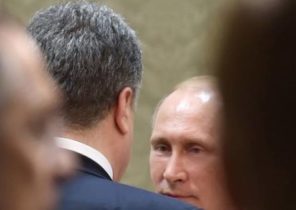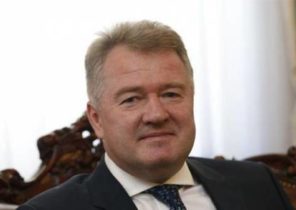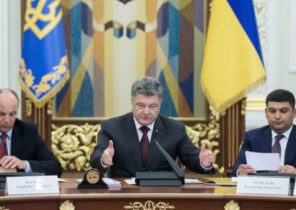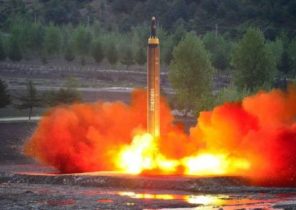Hi, my name is John green (John Green), and this program is “Very intensive course” (Crash Course) on the history of the world. Today we are going to talk about Russia, and this means that we’ll be talking about this guy! Until we talked a lot about Russia, because, first, it is difficult, and, secondly, I really, gavaruy pa ruski — speak a little Russian because I was taught this language at University, so I find it hard to mispronounce words, and this is my strong suit.
Mr. green! Mr. green! And why would you learn Russian?
Well, because I really liked the Russian language as the main subject. But, in any case, I’m sure I still mispronounce everything. So today we are going to talk about the enduring stereotypes about Russia, how Russia received its present form, and we are talking about the chain of events, which we mainly owe to the Mongols. But before we talk about the conquest of the Mongols of Russia, let us discuss the question of what exactly was conquered. The fact that even before the formation of the Russian Empire, or even a Russian Kingdom existed in Kievan Rus.
We know that Kiev was a powerful city-state. But who, in fact, it was founded? It’s a moot point. Most historians today believe that in Kiev, lived the Slavs came there from the coastal areas of the Black sea. But there is an older theory that the true founders was, in fact, Vikings. If you believe this theory, the Vikings reached Kiev on such rivers as the Dnieper, and founded a trading Outpost similar to the one that they had in Iceland and Greenland. It’s a great idea and all, but Russian is the one language spoken by Rus, it sounds more like the Slavic, and not, say, Swedish.
To illustrate — here, for example, a Swede fighting with a Russian about who founded Kiev. Kiev was founded by the Slavic ancestors of Russia. No, Kiev was founded by Swedes. Well, okay, so trade was very important for Kiev. Almost all of his war ended with agreements on trade concessions and the ceiling of his laws was devoted mainly to trade issues. The Rus traded such commodities as furs, wax and slaves, We will not take surprisingly sharp etymological arguments about whether there is the word “Slavs” from the word from the Latin word “slave”, because there is nothing more terrible and extremely wordy than the heated debates of specialists in etymology. But, really, the Rus traded slaves.
But she was also engaged in farming, and man’s relation to land was defined as social status and the size of its tax burden. And if the resident of Russia formed a debt on taxes — and many peasants found themselves in a similar position, — then it is forever tied to the land, which he farmed. In my opinion, with such of the slave dynamics is all right, and it can serve as a model of social organization, but if very hard and long to put pressure on the proletariat, it could lead to a Communist revolution. But I’m ahead of myself.
A couple of things relative to Kiev. First, the ruler of Kiev was called the Grand Duke, and he became a model for other Russian princes. And besides, the early Grand princes made the fateful decision — they were Byzantine Christians. In accordance with the existing legend, Prince Vladimir chose to convert the Rus to Byzantine Christianity in the eleventh century. Presumably, he preferred Christianity to Islam due to the fact that Islam prohibits the consumption of alcohol. He said Drinking is the joy of Rus.
Anyway, the Kievan Rus eventually fell in 1240, and then there was these guys and took their place. By this time Russia fought for centuries with the nomadic tribes; from the Khazars to the Pechenegs and Cumans, and from all this she was tired. And that made her easy prey.
The period of Mongol rule in Russia also known as the “appanage Rus”. Destiny is a Principality, and during this period, several Russian princes were fighting for control of territory, and such things is not a good recipe for stability or economic growth, and this is another topic that will occur in Russian history. By the way, I still call it Russia, but if you would have done it in the XIII century, people would have looked at you strangely. They would have said, “What do you mean when you say Russia?” And yet, where did you get those pants and those teeth? Hmm… do I detect a strange smell”.
Well, well. To discuss how important the Mongols were to Russia, let’s turn to the Bladder thoughts.
The Mongols, indeed, established the reign of the Golden Horde in Russia, but it had no lasting impact on existing forms of power that have already been established by the residents of Kiev. However, it has caused some population movement from the South, where Kiev, on the North-East. This was partly attributable to a desire to move away from the Mongols and their brutal raids, but it should be noted that they were relatively easy rulers — were satisfied with their lives in their yurts and collect tribute from constantly warring Russian princes, and in exchange for his relative freedom these princes had to accept Mongol khans as rulers and allow the Mongols to pick the Grand Prince among the Russian.
Most important, perhaps, was the fact that Mongol rule cut the Russians from Byzantium and further isolated them from Europe, and as a result, Russia was neither Byzantine nor European. She did not, and Mongolian, as the Russians hated the Mongols and generally believed that the Mongols is a punishment from God for their sinfulness and everything. However, the Mongols, in fact, contributed to the growing importance of Moscow, and at the time had the idea that this is Russia. And, by the way, they did what could not do Napoleon, Hitler and many others — the Mongols successfully conquered Russia in the winter. Thank you, Bubble of thought.
So how did the Mongols contribute to strengthening the importance of Moscow and its princes? Well, first, they sometimes came to be called Grand Dukes of Moscow Grand Dukes. And, more importantly, the princes of Moscow had achieved — that is bought the right to collect tribute from the face of the Khan from other princes. It’s a good job, because it is not easy to write something yourself, and then send the assembled Mongols. This is what has allowed the public to enrich themselves. One the Prince particularly successful in this case and his name was Ivan Kalita. Using my knowledge of the Russian language, I would translate his name as “johnny Rich”. According to my Russian teacher, I am very “creative” translator. The whole production allowed Moscow to expand its influence and buy principalities.
In addition, the Mongols also provided them with more direct help in attacking their enemies. Plus, Moscow was located in the upper reaches of the four rivers, and it was convenient for trade. And since the Muscovites in some way were allies of the Mongols, the Mongols rarely attacked them — and this meant that in Moscow thronged by a large number of people, because it was relatively safe. Including Church people. In fact, in 1325 Moscow became the center of Eastern Orthodox Church, and it happened after moving to Metropolitan Peter.
So you might think that the Muscovites would be grateful for all this help from the Mongols, but you would be wrong. When the position of the Mongols in Russia weakened in the second half of the XIV century Dmitry Donskoy, one of the Moscow princes, declared war on them and inflicted the first major defeat of Russia in the battle of Kulikovo. It turned out that the Mongols were not invincible, and it’s always bad for Imperial power.
In addition, the victory over the Mongols made Moscow a hero in the eyes of the Russians. And it helped to reinforce the idea of unification of Russia — the same thing, if you remember, happened when the Persians long before that contributed to the unification of the Greeks. In addition to the expansion of the territory was obtained, the stability, and this was due, largely, with the luck of the Muscovite princes usually had sons which allowed them to hand over power by inheritance. In fact, only once had a serious fight for the right of inheritance, and it happened between the two blind, each of which was named Basil. And, by the way, this is not a joke. Oh, is it not time for the open letter?
Open letter to Basil and Basil. First, let’s see what is in the secret drawer. Oh, Yes it is, Grizzler! (Grizzlor) I have suggested that such Russians saw the Mongols. Dear Basil! Erupted in the XV century in Moscow the civil war was insanely complicated, but it ended up that you guys are blinded to each other. First, Basil II, who, ultimately, was the winner in the civil war, blinded Vasili Squint, as if being cross-eyed was bad enough. It was seen as the end of political career of Vasily the Squint. But then Vasili Squint brother tracked down Basil II and, like, said to him: “I will blind you back.” And, of course, everyone thought it will mean the end of political career of Basil II, but they were wrong. It turns out you can rule Russia like a boss even if you’re blind. All the best. John Green.
After Basil the blind came the real man who increased the power of Moscow was Ivan III, who later became known as Ivan the Great. First, he has strengthened Russia’s independence from the Mongols and stopped paying tribute to the Khan — after the Khan had appointed him Grand Prince, of course. Then he purchased or conquered numerous fiefdoms, and some other just agreed, and thus further increased the power of Moscow. Ivan later declared himself ruler of all Russian and married the niece of the last Byzantine Emperor, which gave it even more legitimacy. And he took the title of Czar and king, Caesar. Basically, Ivan created the first Russian state, and for that he probably deserves title “the Great”.
And here in this place it would be possible to stop, although in this case we will not see that type of absolute rule that characterized Russia throughout almost the entire period of its existence, even under Putin.
Oh, My God! It was just a joke, Putin! You have never manipulated the results of the elections… No, no… Please don’t put me in jail!
Ivan III was able to consolidate the Moscow authorities, however, undeniably a cruel period of Russian rule is not associated with the Mongols, but from Ivan IV, better known under the name of Ivan the terrible. Ivan the terrible, ruled from 1533 to the year 1584, he entered the throne at the age of 16 years, and this is another indication that adolescents should not trust the management of a rising Empire. The reign of Ivan marks the end of the authority of the princes and the beginning of the autocracy, the Russian and famous in the world. But in the beginning, in fact, he was an innovative leader.
As a child, he worked with a group of advisers that were part of the Elected Parliament, which certainly suggests that it was a good thing. He also convened the first Zemsky Sobor, that is great advice, similar to the States-General, which after two hundred years will be so important in France. He also reformed the army, focusing on the use of new technology, that is muskets. However, in the second half of his reign, Ivan earned his nickname Ivan — and it can mean either “bad” or just “awe-inspiring”, depending on your point of view.
Psychological historians pay attention to one thing — Ivan was an awful problem after the death of his beloved wife Anastasia Romanova. Or, they might point to the fact that he’s a kid getting a pleasure from tortured animals. In any case, Ivan began to destroy the power of the nobility — the former princes and landowners called the boyars. They were the last links with the Prince’s power. And after one strange episode where he briefly “denied” by the authorities, Ivan IV returned to Moscow and announced that he has a right to punish traitors and villains. To assist in this matter Ivan created the Oprichnina, a corps of secret police, whose members rode on a black horse dressed all in black. Their task was to pursue and destroy any enemies of the king. Compare also with the Nazgul (nazgul) and the Dementors (dementors). Thus, it was the first Russian cleaning.
And in the second half of his reign the destruction exposed the whole city. It was, in fact, the civil war, though without resistance. One historian called the events of the civil battle. In the end, Ivan IV established absolute control of the Royal control over all the Russian people, but he also set a precedent, because it did this through terror, secret police and the suspension of the laws. And it will affect the entire course of Russian history… that is, in my opinion, as long as Vladimir Putin is the heroic way put an end to this.
Its small eyes. They inspire fear…
Hence the stereotype of Russian brutality and barbarism, but what is also true — the rest of Europe also saw a lot of cruelty and actions of the secret police. However, for many centuries, Russia was considered by Europe and as a European, not as European country as something “other,” which ought to be wary of, because it is not completely different. But when we remember these historical stereotypes about Russia, we should not forget one thing — what you consider barbaric in others, often others feel just as barbaric to you. Thanks for watching, we’ll see you next week.







